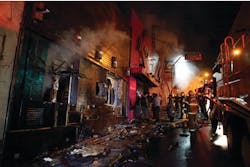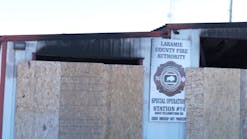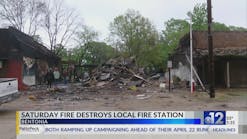Being deployed with the U.S. military to a forward location has allowed me to take a step back and look at prevention from an overall global view, and to see the similarities and contrasts applied to fire protection between the United States and others around the world. One thing in common is many countries, although not all, apply copious amounts of resources to be able to control and contain what starts out as simply a small flame at the end of a match stick.
Fire is a global threat and is a weapon of mass destruction. Recent articles of fire and major losses of life in a Bangladesh factory killing 112 workers, and more recently the Brazilian night club fire that killed over 230 patrons, prove that when fire does strike it claims lives and property in large, dramatic, and tragic ways. Fire will always be a major threat to every community in all four corners of the globe and the fire service needs to stand ready to contain and control that lingering threat that can be found in every home, and in every building, and is lying in wait behind every outlet, on every kitchen stove, and every other possible area a fire can ignite.
While I have read about all these tragic fires and many more, I will admit I am no scientific study on the subject and simply apply a surface observation as an engineer/paramedic from the cab of my engine. As all firefighters I apply the keep it simple stupid (K.I.S.S.) principle to fire service application and leave the analysis to the people at the National Fire Protection Association and U.S. Fire Administration who produce the reports. But this is how I see it. Whether the fire breaks out in Bangladesh or Anytown USA, the same issues and problems apply universally as fire knows no geographic boundary when it strikes; when allowed to start it grows and kills the same way and for the same reasons. Fire is the ultimate global terrorist and right now Bangladesh and Brazil are giving us lessons we need to learn and apply here at home to take this terrorist down.
While residential fires continue to be our biggest problem in the U.S., fires in public buildings, notably assembly occupancies, while occurring less frequently cause the largest loss of life and property. While a common civilian on the street may simply come to the conclusion that the bigger the building the more people inside thus the bigger fire and loss of life, and call such an occurrence a simple "tragedy" and go on with their day; we in the fire service profession (key word profession), sworn to protect life and property from fire, do not have that luxury. Any firefighter worthy of that title knows that these fires and deaths, while yes tragic, did not need to occur and in fact could have been predicted and if it could have been predicted then it could have been prevented. As educated professionals (key word professionals) in the fire service if we know what causes these fires and loss of life and do nothing to prevent them can that mean in some ways are we culpable?
There is no way a fire department protecting Anytown USA can affect or change a fire problem in Bangladesh or anywhere else in their state for that matter. But they can affect change in the community outside their station bay doors. Fire departments need to take ownership of their jurisdictions for the level of fire protection they provide with the amount of data and knowledge that is possessed and available. If a fire department is aware of the causes of fire and death in assembly occupancies' and makes no effort to uncover or correct those decencies in the community they protect, does that not make that department culpable in a large fire or loss of life? How would we fair in the courts of public opinion if we lost 230 citizens in a night club fire due to obvious fire code violations if we are not doing anything towards fire prevention?
Our fire problem in assembly occupancies' most notably started in 1903 at the Iroquois Theatre in Chicago, which claimed 605 people, largely women and children. The theater opened that same year with notable fire safety concerns to include the lack of sprinklers and fire extinguishers. While a list of causes can fill pages of study in the fire's ignition, spread, and ensuing death, it can be summarized as the lack of application of basic fire safety principles' known at that time and lack of public understanding of fire spread and dynamics leading to the ignorance of fire codes and panic - predictable thus preventable.
Push the forward button to Coconut Grove in Boston, in 1942, when a fast moving fire claimed 492 people in less than 12 minutes. The K.I.S.S. principle again summarizes lack of application of basic fire safety principles' known at that time and a lack of public understanding of fire spread and dynamics leading to the ignorance of fire codes and panic. Again predictable and thus preventable.'
Fast-forward to Cincinnati, Ohio, 1977 to a place called the Beverley Hills Supper Club, where a fire killed 165 people. Why? You guessed it; lack of application of basic fire safety principles' known at that time and a lack of public understanding of fire spread and dynamics leading to the ignorance of fire codes and panic. Predictable - preventable.
Lastly (for now) moving forward to Warwick, RI, in 2003, to a place called The Station nightclub, a mirror fire to the Coconut Grove fire 63 years of forgotten lessons before, where a fire claimed 100 people by the nights end and even more as the subsequent years claimed victims of the both physically and psychologically injured victims. Once again the same K.I.S.S. principles' apply here as the underlining plot of these stories continues to spin and produce tragedy.
We've gone forward enough and are now sitting in present times, and what do you think Bangladesh and Brazil will teach us? K.I.S.S.
What is your fire department doing about it? There is no doubt fires like these have been table topped to death, and SOGs and SOPS have been adjusted operationally to prepare line companies to react and respond should a fire of this nature erupt; however, what about the other lessons coming out of all of these fires? What are we doing to address the lack of application of basic fire safety principles' known at this time and lack of public understanding of fire spread and dynamics that will lead to the ignorance of fire codes and to panic?
Does your departmental training program include lessons to firefighters on basic fire codes and how they applied to the fires and losses of life so that the next time they are doing a "walk through" of an assembly occupancy during a strategy and tactics orientation they may actually find the terrorist waiting to strike and stop the tragedy before it unfolds, or K.I.S.S. principle - doing their job and what the public expects? Are your firefighters educated on the dynamics of fire spread through structures beyond the basics of flashover, roll over, and backdraft, so that they fully understand in a way able to effectively educate the public on the need for fire drills and why a fire extinguisher is needed every 75 feet (generally)? Have your firefighters received training on basic human response and reaction to perceived danger to enable them to better understand the reasons and importance behind "trivial" fire codes and to educate the general public on how to handle a fire situation properly; thus the need for Exit signs and fire drills. K.I.S.S.
Something as simple as the proper installation and use of fire extinguishers can save hundreds of lives. Fire extinguishers were absent in the Iroquois Theater, the Coconut Grove club had eleven fire extinguishers present and it's inconclusive as to whether four were partially used or just discharged after being tipped over, there is no mention of their use in Kentucky, and while fire extinguishers could clearly be seen mounted on the walls at The Station nightclub there is no report of any being used.
Do you offer community training for businesses or social clubs on how to properly handle and react to an emergency situation; there are many reports are available on global studies from China to Israel on their theory of individual citizenry and their responsibility during a crisis, along with successful programs to teach their communities how to react and handle them. Just like in everything discussed, these are all lessons learned that are out there and available to your department and firefighters, but are you branching out to expand your fire protection approach to include this information? Is ignorance of this readily available information a moral or ethical excuse when a fire or death occurs? Or does your department remain in a traditional reactive mode waiting for the preventable risk to occur and then throw bodies at it?
If it is predictable then it is preventable and as a fire service we can no longer turn a blind eye to the copious amounts of information and education available on fire prevention and valuable lessons learned from each and every fire. Individual departments cannot control global fire prevention but they can take home the lessons learned in Bangladesh and Brazil, compare and contrast them to fires in the US, and overlay them to their jurisdiction. Are there dangers of fires like these occurring in the community you protect and if so, with all the information and knowledge out there on the cause of these fires and loss of life, are you doing everything you can to prevent that from happening? If you are not, and should a fire in fact occur and lives are lost for the same reasons and the same fashion as fires globally have taught us, are you culpable in that loss as members of a profession sworn to protect lives and property from fire?
While we need to continue to study fire and lessons learned from the operational side, it is time that we also acknowledge and make study of the centuries of data and lessons learned on the prevention side and develop strategies and tactics to address them as well. Operationally we can only respond so fast to these fires that most of the time have flashed over before we get on scene thus limiting any ability to safely operate and save lives and property. Like any enemy fire has progressed and we have to become smarter to beat it and that is quickly being limited to getting ahead of it before the first spark flies.
Right now outside your station doors is possibly the next Station or Brazil nightclub fire in the making. We now know what is most likely going to cause it and what will lead to its spread and body count. What is your department doing with this knowledge and should that fire occur could you be able to look the survivors and family members in the eye and honestly say you did all you could do to save the victims?
The constant blind eye turned towards prevention and the lessons learned as an overall fire service responsibility in its application is costing the lives of those we protect needlessly, and one day very soon we will be called to answer for it; if not legally then definitely morally and ethically, and certainly in the courts of public opinion.
In this day of globalization it's time to learn and take these global lessons clearly provided and apply them locally to each and every community, and most importantly to those who are depending on you to keep them and their loved ones safe tonight.
DANIEL BYRNE, a Firehouse.com Contributing Editor, is a firefighter/paramedic, with the Burton Fire District in Burton, SC. A 20-year veteran of the emergency services, he holds both an associate and bachelors degree in fire science, is a National Fire Academy Alumni, and a veteran of the Desert Shield/Storm war with the U.S. Marine Corps. Daniel is the recipient of local and state awards for public educations and relations. Daniel is moderator of the Fire Prevention and Life Safety forums on Firehouse. You can reach Daniel by e-mail at[email protected].






